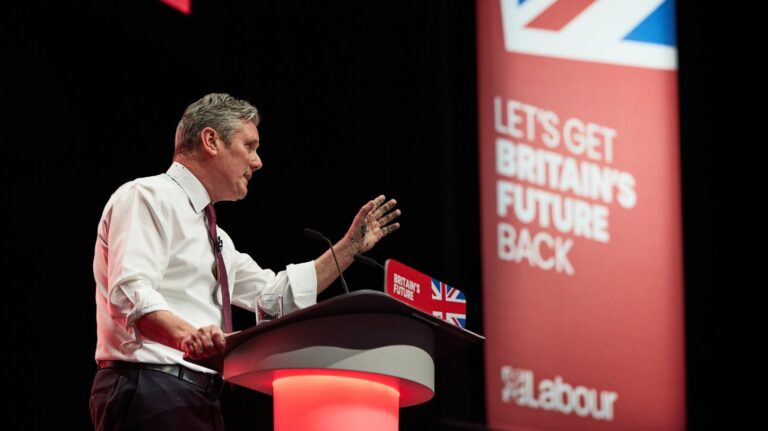CiTTi Magazine reflects on Labour’s 2024 UK general election victory and its potential ramifications for the transport sector…
The Labour Party’s landslide victory in the 2024 UK general election on 04 July has set the stage for potentially transformative changes in the country’s transport sector. With Labour securing 412 of the 650 seats in Parliament, the party now has a clear mandate to implement its transport policies. As prime minister Keir Starmer remarked at the time on X, “We said we will stop the chaos. And we will. We said we will turn the page. And we have. The work of change begins today.”
Indeed, Labour’s transport manifesto was a bold declaration of intent, focusing on public ownership, sustainability, and long-term planning. Newly appointed secretary of state for transport Louise Haigh has promised to “deliver the biggest overhaul of public transport in a generation – putting passengers first, and transport infrastructure fit for modern Britain”.
Among the most notable pledges is the renationalisation of Britain’s railways, with contracts to be terminated or allowed to expire in favour of public ownership. “This is about more than just ownership; it’s about creating a service that truly works for the public,” said Haigh. “Our goal is to build a rail network that is reliable, affordable, and serves the needs of the nation, not the interests of private shareholders.”
The establishment of Great British Railways (GBR) is central to this vision. GBR will unify track and train operations under a single public body, aiming to eliminate inefficiencies and improve service delivery. “We’re committed to driving forward rail reform,” Haigh stated. “We will focus relentlessly on improving performance and delivering much-needed changes to the system.”
Labour is also committed to accelerating the transition to electric vehicles (EVs), reinstating the 2030 phase-out date for new internal combustion engine (ICE) vehicles. “Reinstating this deadline is a crucial step toward meeting our climate goals,” says Ian Foley, CEO of Equipmake. “It sends a clear signal that the UK is serious about leading the global shift to zero-emission mobility.”
FAST FACT: Labour could be set to introduce a pay-per-mile road pricing scheme in the 2024 Autumn Budget. Source: The Telegraph
In the realm of road infrastructure, Labour has pledged to fix an additional one million potholes annually, a commitment welcomed by many in the transport industry. “Our roads are in dire need of repair,” notes Simon Williams, head of policy at RAC. “Labour’s commitment is a step in the right direction, but the scale of the problem means that much more will be needed to address the long-term neglect of our roadways.”
The party’s manifesto also includes significant reforms for the bus system, with plans to lift the ban on municipal ownership and empower local leaders to franchise bus services. “Buses are the backbone of many communities,” says Graham Vidler, CEO of the Confederation of Passenger Transport (CPT).
“Labour’s plans to improve bus services are critical, but they must be supported by stable, long-term investment to avoid a return to commercial fares that could harm passengers.”
Labour’s key transport policies at a glance
- Fix an additional one million potholes across England each year of the next parliament.
- Support the transition to electric vehicles by accelerating the rollout of chargepoints and restoring the phase-out date of 2030 for new cars with internal combustion engines.
- Overhaul Britain’s railways, bringing them into public ownership as existing contracts expire or are broken.
- Great British Railways will deliver a unified system focusing on reliable, affordable, high-quality, and efficient rail services.
- Promote and grow the use of rail freight and create a tough new passenger watchdog to drive up industry standards.
- Reform the bus system by providing new powers for local leaders to franchise local bus services and lifting the ban on municipal ownership.
- Give local communities control over routes and schedules, improving reliability and accessibility.
- Empower mayors to create unified and integrated transport systems, promoting seamless journeys and active travel networks.
- Develop a long-term strategy for transport infrastructure to ensure efficient and timely delivery.
- Tackle congestion and promote active travel networks, ensuring infrastructure meets the needs of modern transportation demands.
Laying the legislative foundation
The appointment of Haigh as secretary of state for transport has been widely regarded as a strong signal of Labour’s commitment to its transport agenda. In her first address to the UK Department for Transport (DfT), Haigh outlined five strategic priorities for her tenure: improving railway performance and driving forward rail reform; enhancing bus services and increasing usage; transforming infrastructure to promote social mobility and tackle regional inequality; delivering greener transport; and better integrating transport networks.
“It will take all our effort, but our new motto is simple: move fast and fix things,” Haigh declared. “Transport is central to achieving the government’s missions for growth, net zero, and social mobility.”
Haigh also announced the appointment of Lord Hendy of Richmond Hill as rail minister, Lilian Greenwood as future of roads minister, Simon Lightwood as local transport minister, and Mike Kane as aviation, maritime, and security minister.

The King’s Speech, delivered shortly after Labour’s electoral victory, outlined the legislative priorities for the coming parliamentary session, with transport taking centre stage. The Rail Reform Bill will formally establish Great British Railways and initiate the process of bringing rail services back into public ownership. This legislation is seen as a critical step towards creating a more integrated and efficient rail system that prioritises passenger needs over profit.
The Better Buses Bill will empower local authorities to take control of their bus services, allowing them to franchise or publicly own these services. “This could revolutionise public transport in many areas,” says Jason Prince, director of Urban Transport Group. “The ability to tailor services to local needs and improve reliability is something that has been long overdue.”
Additionally, the government has committed to expanding cycling and walking infrastructure, aligning with its broader goal of promoting active travel and reducing carbon emissions. “We need to make sustainable travel easier and safer,” says Matt Finch, UK policy manager at Transport & Environment. “This focus on active travel is a positive step, but it must be supported by substantial investment and robust implementation.”
King’s speech takeaways
Several bills related to transport were announced in the first King’s Speech delivered under a Labour government in 15 years. The announcements focused on driving economic growth, the first of UK prime minister Sir Keir Starmer’s five “missions for national renewal”. Big ticket items included the:
- English Devolution Bill, which gives new powers to metro mayors and combined authorities to support local growth plans that bring economic benefit to communities.
- Better Buses Bill, which will remove the ban on publicly owned buses so local lenders can take control of their local bus services.
- Passenger Railway Services (Public Ownership) Bill, which will bring rail services back into public ownership, aims to improve passenger journeys, saving the taxpayer millions of pounds.
- Rail Reform Bill, which will bring together the management of the network and the delivery of passenger services into a single public body – Great British Rail.
- Sustainable Aviation Fuel (Revenue Support Mechanism) Bill, which will support sustainable aviation fuel production.
- Great British Energy Bill, which will see the establishment of Great British Energy, a publicly owned clean power company headquartered in Scotland, to help accelerate investment in renewable energy such as offshore wind and power the rest of the UK. It will develop, own and operate assets with a capitalisation of £8.3bn.
- Planning and Infrastructure Bill, which aims to “get Britain building” via planning reform and accelerate the delivery of high-quality infrastructure and housing.
Optimism with caution
The transport industry has generally welcomed Labour’s legislative agenda, though there are significant concerns about the feasibility and financial implications of these plans. “Labour’s transport policies could be transformative,” says Richard Hebditch, board member, London TravelWatch, “but there’s a risk of missing key opportunities, especially in areas such as trucking, aviation, and shipping. These are critical to meeting our climate goals, and they must not be overlooked.”
Underscoring the importance of taking a strategic approach, Sue Percy, chief executive of the Charteredv Institution of Highways & Transportation, says: “This is a time for vision and leadership. The new government must commit a long-term investment strategy for roads and transport infrastructure that supports economic growth and social wellbeing.”
However, Williams expresses concern about the state of the country’s roads, urging the government to prioritise road maintenance alongside other transport initiatives. “Fixing Britain’s broken roads is essential, but it will require more than just the promised £320m from scrapping the A27 Arundel bypass,” he warns. “The funding shortfall left by the previous government needs to be addressed if we’re to see real improvement.”
FAST FACT: The previous UK government left a £22bn public spending gap this year – £2.9bn of which is unfunded transport commitments. Source: UK DfT
It appears that Labour’s transport agenda will face significant financial and logistical challenges. The renationalisation of the railways, while popular among the public, could be costly and complex. Haigh has already commissioned an internal review of the UK DfT’s capital spend portfolio to address a £22bn public spending gap, including £2.9bn in unfunded transport commitments inherited from the previous government. “We are committed to finding solutions,” Haigh stated. “This review will help us develop a sustainable strategy that delivers on our promises and provides value for money.
Another major challenge is the transition to electric vehicles (EVs). Thom Groot, CEO of Electric Car Scheme, emphasises the urgency of action. “If Labour is serious about reinstating the 2030 ICE ban, they need to extend low benefit-in-kind rates until 2035 and lower VAT on public charging. “Affordability is the biggest barrier to EV adoption, and the government must act now to ensure the 2030 target is achievable.”
The bus sector also faces significant hurdles, particularly as the £2 fare cap is set to end in December. Vidler stresses: “Stable long-term investment in the bus sector will be critical, but immediate action must prevent a cliff edge return to fully commercial fares – a scenario that would harm passengers and services.”
Critical juncture
Labour’s 2024 election victory represents a critical juncture for the UK’s transport sector. While the party’s plans have the potential to transform the nation’s transport infrastructure, making it more sustainable, equitable, and efficient, the road ahead is challenging, with financial constraints, logistical hurdles, and ambitious environmental targets all requiring careful navigation.
As the new government begins to implement its transport pledges the industry’s response will be crucial in shaping the success of these initiatives. In this new era of transport policy, Labour could leave a lasting legacy. But to do so, it must balance ambition with pragmatism, ensuring that its plans are not only visionary but also grounded. The stakes are high, and the eyes of the nation are on the Labour government as it embarks on this transformative journey.
This article was originally published in the September 2024 issue of CiTTi Magazine.
Achievements and innovations in sustainable urban mobility will be celebrated at the third annual CiTTi Awards, which will be held on 26 November 2024 at De Vere Grand Connaught Rooms in London. Please visit www.cittiawards.co.uk to learn more about this unmissable event for the UK’s transportation sector – and to book your table!





